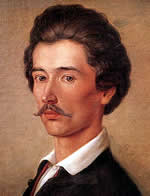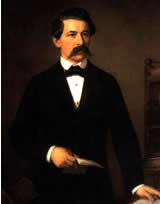
Sándor Petőfi (1823-1849) was a Hungarian national poet and a key figure in the Hungarian Revolution of 1848.
He composed the national poem "Talpra Magyar" (1848), and several epics, the most popular of which is János Vitéz (1845, "John the Valiant"), included in the school program.
In his poetry Sándor Petőfi used folklore elements and traditional song-like verses. He promoted Hungarian as a language of literature and theatre, and was a close friend with János Arany, one of the greatest Hungarian writers and founders of National Theatre.
Petőfi was among the leaders of revolution in Pest, co-author and, respectively, author of the two most important written documents: "12 Pont" ("12 Points", demands to the Habsburgs) and the "Nemzeti Dal" ("National Song" that became the official Song of Revolution).
Today, hundreds of streets are named after him throughout Hungary, a national radio station and a bridge in Budapest. The National Museum of Literature is also named after him.

János Arany (1817-1882), was Hungary's greatest epic poet, journalist, writer, and translator. He wrote more than 40 ballads which have been translated into over 50 languages. He was also a figure in the Hungarian Revolution of 1848.
He translated three Shakespeare’s dramas into Hungarian, and his translations are considered to be some of the greatest translations into Hungarian in history. He also translated works by Mikhail Lermontov, Aleksandr Pushkin, and Molière.
His most famous work is Toldi trilogy, an epic tracing the life of the 14th-century Hungarian hero.
In Budapest eleven streets and one square are named after Arany János.